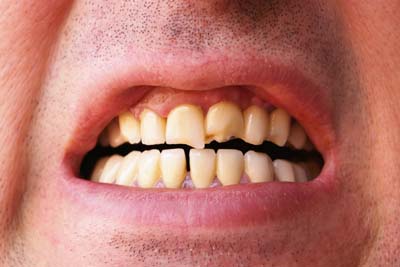Dental Restoration Treatments for a Broken Tooth

Are you looking into broken tooth restoration options? When someone breaks one of their teeth, treatment depends on the severity of the break. General dentists recommend early treatment for the highest chance of a successful restoration.
Reasons teeth can break
Teeth can break for several reasons, and understanding the cause can help dictate the restoration. For example, individuals that play sports or tend to roughhouse may be more prone to breaks. Additionally, those with weak teeth due to decay or gum disease should expect a broken tooth if treatment is not acted upon promptly. Finally, a broken tooth sometimes results from an accident such as a fall, which is uncontrollable and unpreventable.
Restoring a broken tooth
General dentists may recommend three options for a tooth fracture, dental bonding, a dental crown, and root canal therapy. The type of restoration option that the dentist recommends depends on each patient's unique oral condition.
Dental bonding
Dental bonding is a restoration treatment option often used to repair minor breaks in a patient's teeth. The bonding material consists of composite resin and allows a dental professional to restore the broken tooth to its previous condition. The material is also tooth-colored, which supports a patient's dental cosmetics. Bonding is a restoration treatment option that does not require any anesthesia, and dental professionals can often perform this treatment option in less than 30 minutes.
Dental crown
A dental crown is a common treatment used to restore a tooth that is broken as it is strong and long-lasting. A dental crown can be placed over the tooth to prevent a cracked tooth from further breakage. A dental crown helps give the tooth back its strength and durability so it will not break under regular use, e.g., chewing. It may be necessary for a dental professional also to use a special dental filling to make the broken tooth stronger.
Root canal therapy
Serious tooth breaks that have reached the inside of a tooth will require a patient to undergo a root canal. This restoration treatment is necessary to save the tooth, as once the inside of a tooth is jeopardized, it requires a root canal procedure. Root canal restoration treatments for restoring a broken tooth need a dental professional to thoroughly clean the tooth and then fill the tooth with a special dental material. Once the root canal procedure is over, a crown is often placed over the tooth to make it strong again.
Conclusion
Both minimally-invasive and non-invasive restoration options are available for those needing a broken tooth treatment. Therefore, patients can take the next step today. The fact that there are different methods for restoring broken teeth makes it necessary for those needing treatment to be seen by a dentist to determine which treatment is best. In addition, fixing a broken tooth is aesthetically pleasing, and having a full set of teeth promotes an overall healthy mouth.
For those considering a broken tooth treatment in the Palmer area, we encourage you to call our office at (907) 745-1966. Additionally, patients may learn more about treatment options at https://www.vndak.com.
Check out what others are saying about our dental services on Yelp: Broken Tooth in Palmer, AK.
Related Posts
One of the more conservative procedures offered as part of a smile makeover is composite dental bonding. Read on to learn more about this restorative procedure. The procedure involves using composite resin to restore a tooth's structural integrity while also improving its look. Dental bonding may be used to fix problems including stained teeth, gapped…
The role of preventative dentistry is to minimize the risk of future dental issues in patients. Read on to learn some tips that encourage the prevention of oral issues. If you have experienced and treated dental issues in the past, you will attest that it is better to prevent them from happening in the first…
Teeth straightening is a common treatment that dentists offer to enhance one's smile and improve oral health. There are a few different options that one can consider; however, ultimately, the treatment will depend on the severity of the abnormality, the dentist's recommendation, and the goal. Continue reading to learn more about some of the most…
An emergency dentist provides immediate care for urgent dental issues. Dental emergencies can happen anytime, often causing pain or discomfort that cannot wait for a regular appointment. Recognizing the signs of a dental emergency helps patients seek the right care quickly and can prevent further complications and protect their oral health.A dental emergency calls for…
